一般将来时知识点(大全)经典
一般将来时 知识点
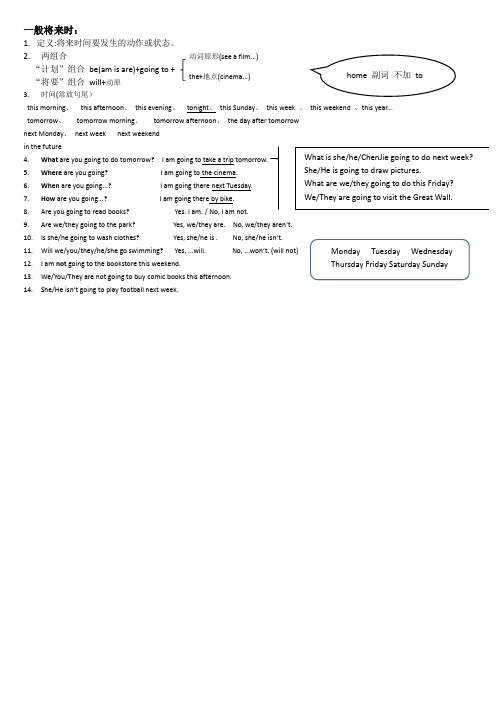
一般将来时:1. 定义:将来时间要发生的动作或状态。
2. 两组合 “计划”组合 be(am is are)+going to + “将要”组合 will+动原3. 时间(常放句尾) this morning 、 this afternoon 、 this evening 、 tonight 、 this Sunday 、 this week 、 this weekend 、this year... tomorrow 、 tomorrow morning 、 tomorrow afternoon 、 the day after tomorrownext Monday 、 next week next weekendin the future4.What are you going to do tomorrow?I am going to take a trip tomorrow. 5.Where are you going?I am going to the cinema. 6.When are you going...? I am going there next Tuesday. 7.How are you going...? I am going there by bike. 8.Are you going to read books? Yes. I am. / No, I am not. 9. Are we/they going to the park? Yes, we/they are. No, we/they aren ’t. 10. Is she/he going to wash clothes? Yes, she/he is . No, she/he isn ’t.11. Will we/you/they/he/she go swimming? Yes, ...will. No, ...won ’t. (will not)12. I am not going to the bookstore this weekend.13. We/You/They are not going to buy comic books this afternoon.14. She/He isn ’t going to play football next week. 动词原形(see a film...)the+地点(cinema...)。
【英语】一般将来时知识点(大全)(1)
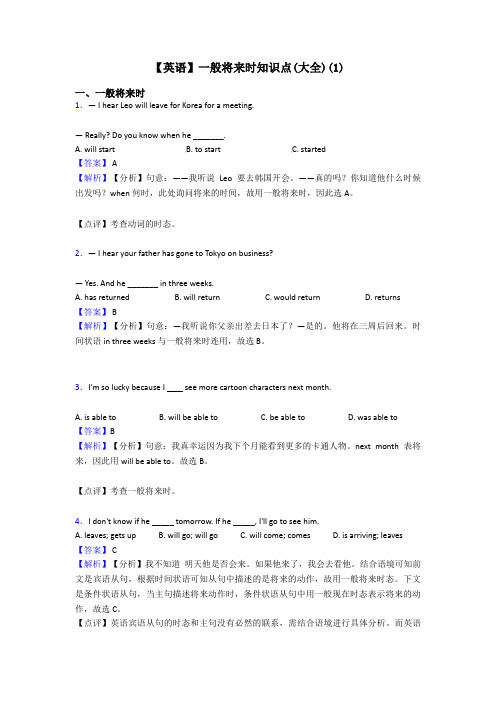
【英语】一般将来时知识点(大全)(1)一、一般将来时1.— I hear Leo will leave for Korea for a meeting.— Really? Do you know when he _______.A. will startB. to startC. started【答案】 A【解析】【分析】句意:——我听说Leo要去韩国开会。
——真的吗?你知道他什么时候出发吗?when何时,此处询问将来的时间,故用一般将来时,因此选A。
【点评】考查动词的时态。
2.— I hear your father has gone to Tokyo on business?— Yes. And he _______ in three weeks.A. has returnedB. will returnC. would returnD. returns【答案】 B【解析】【分析】句意:—我听说你父亲出差去日本了?—是的。
他将在三周后回来。
时间状语in three weeks与一般将来时连用,故选B。
3.I’m so lucky because I see more cartoon characters next month.A. is able toB. will be able toC. be able toD. was able to【答案】B【解析】【分析】句意:我真幸运因为我下个月能看到更多的卡通人物。
next month表将来,因此用will be able to。
故选B。
【点评】考查一般将来时。
4.I don't know if he _____ tomorrow. If he _____, I'll go to see him.A. leaves; gets upB. will go; will goC. will come; comesD. is arriving; leaves 【答案】 C【解析】【分析】我不知道明天他是否会来。
一般将来时知识点(大全)

译林版中考英语九年级英语一般将来时知识点(大全)一、初中英语一般将来时1.—Have you finished the poster for the party?—Not yet. I it in two days.A. finishB. finishedC. will finishD. have finished【答案】 C【解析】【分析】此题的关键点在“in two days”和一般将来时连用,故选C。
句意是:—你已经完成聚会的海报了吗?—还没有,我会在两个以后完成的。
【点评】本题考查介词短语“ in +时间段”用于一般将来时。
2.—Do you know when Mrs. White for dinner this evening?—No, but I think she when she is free.A. will come; will comeB. will come; comesC. comes; will come【答案】 A【解析】【分析】句意:——你知道怀特太太今晚是否来吃晚饭吗?——不知道。
但我认为如果她有空,她会来。
空一,句子为含有宾语从句的主从复合句,主句是一般现在时,从句用它所需要的任何时态,根据this evening今晚,可知句子为一般将来时,will come;空二,回答是when引导的时间状语从句,从句是一般现在时,主句应用将来时,will come,故选A。
【点评】此题考查从句的时态。
3.Michael _________ in a school in Yunnan from February to June next year.A. teachB. taughtC. will teachD. was teaching【答案】C【解析】【分析】句意:Michael将会在明年2月到6月在云南的学校教学。
A动词原形;B一般过去时;C是一般将来时;D是过去进行时。
高中英语一般将来时知识点总结

高中英语一般将来时知识点总结高中英语一般将来时知识11.1 一般将来时的构成肯定句:主语 + shall/will + 动词原形...否定句:主语 + shall/will + not + 动词原形...疑问句:Shall/Will + 主语 + 动词原形...?疑问代词/疑问副词 + shall/will + 主语 + 动词原形...?1.2 一般将来时的肯定句句型:主语 + shall/will + 动词原形....在书面语中,如果主语是第一人称,常用“助动词shall + 动词原形”构成一般将来时的肯定句,即“I/we + shall + 动词原形”;shall可缩写为'll:If I have time tomorrow,I think I'll get a haircut.如果我明天有时间,我想去理个发在口语中,所有的人称都可以用will,即“主语(所有人称) + will + 动词原形...”;will可缩写为'll:Some day,I'll tell you.将来某一天我会告诉你的。
1.3 一般将来时的否定句句型:主语 + will/shall + not + 动词原形...一般将来时的否定句是在will/shall后加not;will not可缩写为won't;shall not可缩写为shan't:Mary won't go to the party.玛丽不会去参加晚会。
1.4 一般将来时的一般疑问句句型:Shall/Will + 主语 + 动词原形...回答方式:Yes,主语 + shall/will.No,主语 + shall/will + not.一般将来时的一般疑问句是将助动词shall/will置于主语之前(大写shall/will的第一个字母),在句尾加问号;这种语序是主语和谓语倒装语序:Will he come? 他来吗?Will you be at our next meeting? 我们下次开会你来吗?Will you be free tonight? —Yes,I will./No,I won't(be free).今晚你有空吗? ——是,我有空。
【英语】一般将来时知识点(大全)经典1
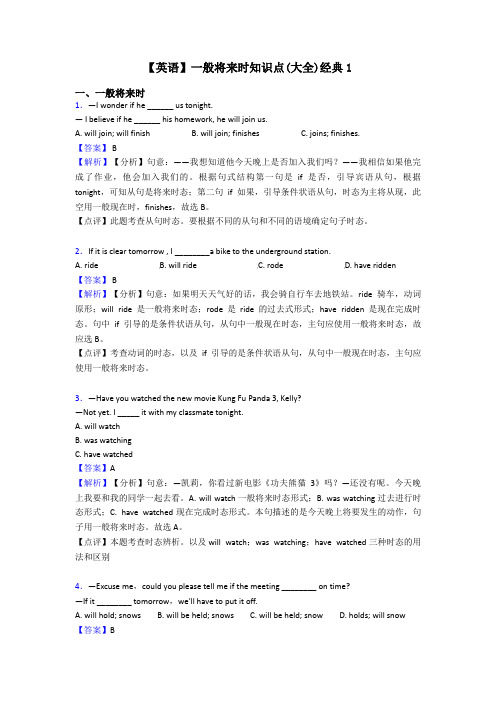
【英语】一般将来时知识点(大全)经典1一、一般将来时1.—I wonder if he ______ us tonight.— I believe if he ______ his homework, he will join us.A. will join; will finishB. will join; finishesC. joins; finishes.【答案】 B【解析】【分析】句意:——我想知道他今天晚上是否加入我们吗?——我相信如果他完成了作业,他会加入我们的。
根据句式结构第一句是if是否,引导宾语从句,根据tonight,可知从句是将来时态;第二句if如果,引导条件状语从句,时态为主将从现,此空用一般现在时,finishes,故选B。
【点评】此题考查从句时态。
要根据不同的从句和不同的语境确定句子时态。
2.If it is clear tomorrow , I ________a bike to the underground station.A. rideB. will rideC. rodeD. have ridden【答案】 B【解析】【分析】句意:如果明天天气好的话,我会骑自行车去地铁站。
ride骑车,动词原形;will ride是一般将来时态;rode是ride的过去式形式;have ridden是现在完成时态。
句中if引导的是条件状语从句,从句中一般现在时态,主句应使用一般将来时态,故应选B。
【点评】考查动词的时态,以及if引导的是条件状语从句,从句中一般现在时态,主句应使用一般将来时态。
3.—Have you watched the new movie Kung Fu Panda 3, Kelly?—Not yet. I _____ it with my classmate tonight.A. will watchB. was watchingC. have watched【答案】A【解析】【分析】句意:—凯莉,你看过新电影《功夫熊猫3》吗?—还没有呢。
最新一般将来时知识点(大全)
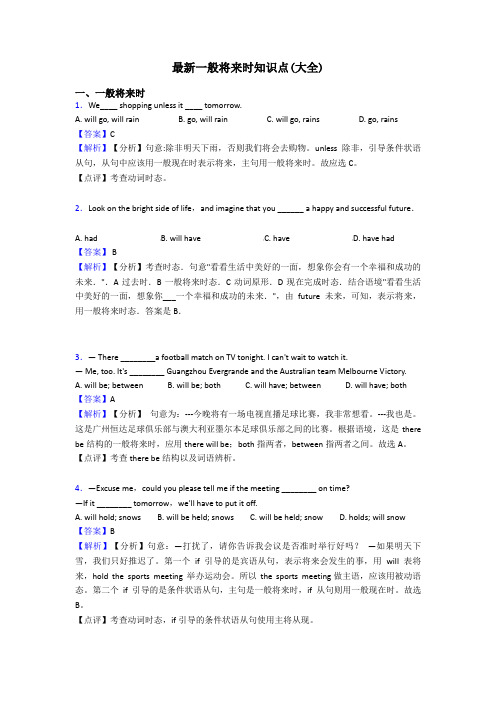
最新一般将来时知识点(大全)一、一般将来时1.We____ shopping unless it ____ tomorrow.A. will go, will rainB. go, will rainC. will go, rainsD. go, rains【答案】C【解析】【分析】句意:除非明天下雨,否则我们将会去购物。
unless 除非,引导条件状语从句,从句中应该用一般现在时表示将来,主句用一般将来时。
故应选C。
【点评】考查动词时态。
2.Look on the bright side of life,and imagine that you ______ a happy and successful future.A. hadB. will haveC. haveD. have had【答案】 B【解析】【分析】考查时态.句意"看看生活中美好的一面,想象你会有一个幸福和成功的未来.".A过去时.B一般将来时态.C动词原形.D现在完成时态.结合语境"看看生活中美好的一面,想象你___一个幸福和成功的未来.",由future未来,可知,表示将来,用一般将来时态.答案是B.3.— There ________a football match on TV tonight. I can't wait to watch it.— Me, too. It's ________ Guangzhou Evergrande and the Australian team Melbourne Victory.A. will be; betweenB. will be; bothC. will have; betweenD. will have; both【答案】A【解析】【分析】句意为:---今晚将有一场电视直播足球比赛,我非常想看。
---我也是。
这是广州恒达足球俱乐部与澳大利亚墨尔本足球俱乐部之间的比赛。
一般将来时态知识点详解(初中英语专项复习) (4)
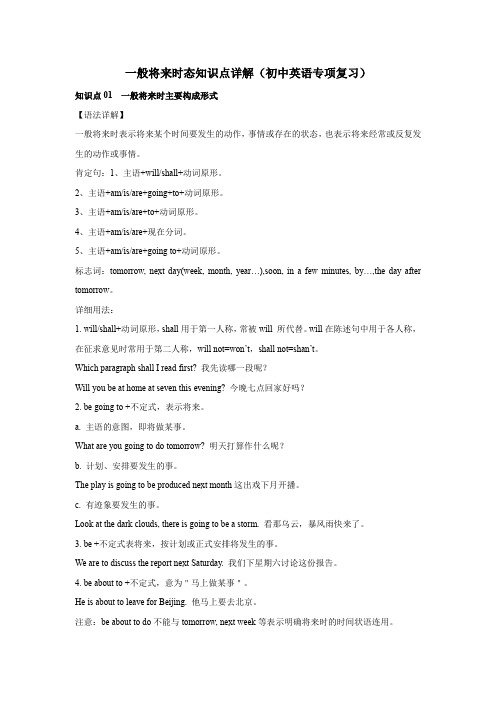
一般将来时态知识点详解(初中英语专项复习)知识点01 一般将来时主要构成形式【语法详解】一般将来时表示将来某个时间要发生的动作,事情或存在的状态,也表示将来经常或反复发生的动作或事情。
肯定句:1、主语+will/shall+动词原形。
2、主语+am/is/are+going+to+动词原形。
3、主语+am/is/are+to+动词原形。
4、主语+am/is/are+现在分词。
5、主语+am/is/are+going to+动词原形。
标志词:tomorrow, next day(week, month, year…),soon, in a few minutes, by…,the day after tomorrow。
详细用法:1. will/shall+动词原形,shall用于第一人称,常被will 所代替。
will在陈述句中用于各人称,在征求意见时常用于第二人称,will not=won’t,shall not=shan’t。
Which paragraph shall I read first? 我先读哪一段呢?Will you be at home at seven this evening? 今晚七点回家好吗?2. be going to +不定式,表示将来。
a. 主语的意图,即将做某事。
What are you going to do tomorrow? 明天打算作什么呢?b. 计划、安排要发生的事。
The play is going to be produced next month这出戏下月开播。
c. 有迹象要发生的事。
Look at the dark clouds, there is going to be a storm. 看那乌云,暴风雨快来了。
3. be +不定式表将来,按计划或正式安排将发生的事。
We are to discuss the report next Saturday. 我们下星期六讨论这份报告。
一般将来时知识点

一般将来时一、知识梳理(一)基本用法1.概念一般将来时表示将来某一时刻的动作或状态,或将来某一段时间内经常的动作或状态。
2.构成基本构成句型例句am/is/are going todo肯定句I am going to go fishing next weekend.否定句I am not going to go fishing next weekend.一般疑问句Are you going to go fishing next weekend?特殊疑问句What are you going to do next weekend?will/shall do肯定句I shall/will visit my grandmother on Sunday.否定句I shall/will not(won’t)visit my grandmotheron Sunday.一般疑问句---Will you visit my grandmother on Sunday?---Yes,I will./No,I won’t.特殊疑问句What will you do on Sunday?3.常用时间状语明天下个XX后明天:tomorrow,后面可以加morning,afternoon,evening下个:next,后面可以加week,month,year等XX后:after和in,后面可以加three weeks/months/years这里要注意一下,after后加时间点才表示将来,如after3o’clock。
加时间段表示过去,如after2hours表示过去。
in后加时间段表将来,如in two years。
(二)考点1.will和shall的区别will可用于所有人称,但shall仅表示单纯将来时,用于第一人称I和we,作为will的一种替代形式。
以You and I为主语时通常避免用shall。
如:He will be back soon.他很快就会回来。
- 1、下载文档前请自行甄别文档内容的完整性,平台不提供额外的编辑、内容补充、找答案等附加服务。
- 2、"仅部分预览"的文档,不可在线预览部分如存在完整性等问题,可反馈申请退款(可完整预览的文档不适用该条件!)。
- 3、如文档侵犯您的权益,请联系客服反馈,我们会尽快为您处理(人工客服工作时间:9:00-18:30)。
一般将来时知识点(大全)经典一、一般将来时1.— Where is your uncle?—He____ America and he ____New York for two weeks.A. has been to; has been inB. has gone to; will stay inC. has been in; has been toD. has stayed in; has gone to【答案】 B【解析】【分析】句意:——你叔叔在哪里?——他去美国了并且他要在纽约呆两周。
has gone to到某地去了,has been to去过某地,从Where is your uncle判断下面说的是他去美国了,用has gone to;后面说他将会在纽约呆两周,用一般将来时,构成will+动词原形。
故选B。
【点评】此题考查现在完成时和一般将来时。
要根据上下文的联系确定句子的时态。
2.— I hear your father has gone to Tokyo on business?— Yes. And he _______ in three weeks.A. has returnedB. will returnC. would returnD. returns【答案】 B【解析】【分析】句意:—我听说你父亲出差去日本了?—是的。
他将在三周后回来。
时间状语in three weeks与一般将来时连用,故选B。
3.I don't know whether mom _________ me to Beijing next week.A. takeB. takesC. will takeD. would take【答案】 C【解析】【分析】句意:我不知道妈妈下周是否会带我去北京。
分析句子结构可知,此处是宾语从句,主句时态为一般现在时,从句时态根据主现从任原则,再根据从句中的next week可知,从句应该是表示将来的动作,所以用一般将来时,用will do形式,故选C。
【点评】考查宾语从句时态。
注意宾语从句时态的主现从任原则。
4.—Do you know when Mrs. White for dinner this evening?—No, but I think she when she is free.A. will come; will comeB. will come; comesC. comes; will come【答案】 A【解析】【分析】句意:——你知道怀特太太今晚是否来吃晚饭吗?——不知道。
但我认为如果她有空,她会来。
空一,句子为含有宾语从句的主从复合句,主句是一般现在时,从句用它所需要的任何时态,根据this evening今晚,可知句子为一般将来时,will come;空二,回答是when引导的时间状语从句,从句是一般现在时,主句应用将来时,will come,故选A。
【点评】此题考查从句的时态。
5.—Have you watched the new movie Kung Fu Panda 3, Kelly?—Not yet. I _____ it with my classmate tonight.A. will watchB. was watchingC. have watched【答案】A【解析】【分析】句意:—凯莉,你看过新电影《功夫熊猫3》吗?—还没有呢。
今天晚上我要和我的同学一起去看。
A. will watch一般将来时态形式;B. was watching过去进行时态形式;C. have watched现在完成时态形式。
本句描述的是今天晚上将要发生的动作,句子用一般将来时态。
故选A。
【点评】本题考查时态辨析。
以及will watch;was watching;have watched三种时态的用法和区别6.Michael _________ in a school in Yunnan from February to June next year.A. teachB. taughtC. will teachD. was teaching【答案】C【解析】【分析】句意:Michael将会在明年2月到6月在云南的学校教学。
A动词原形;B一般过去时;C是一般将来时;D是过去进行时。
Next year是一般将来时的时间状语,will+动词原形,故答案为C。
【点评】考查动词的时态,注意句中的时间状语。
7.Look on the bright side of life,and imagine that you ______ a happy and successful future.A. hadB. will haveC. haveD. have had【答案】 B【解析】【分析】考查时态.句意"看看生活中美好的一面,想象你会有一个幸福和成功的未来.".A过去时.B一般将来时态.C动词原形.D现在完成时态.结合语境"看看生活中美好的一面,想象你___一个幸福和成功的未来.",由future未来,可知,表示将来,用一般将来时态.答案是B.8.—Excuse me,could you please tell me if the meeting ________ on time?—If it ________ tomorrow,we'll have to put it off.A. will hold; snowsB. will be held; snowsC. will be held; snowD. holds; will snow 【答案】B【解析】【分析】句意:—打扰了,请你告诉我会议是否准时举行好吗?—如果明天下雪,我们只好推迟了。
第一个if引导的是宾语从句,表示将来会发生的事,用will表将来,hold the sports meeting 举办运动会。
所以the sports meeting做主语,应该用被动语态。
第二个if引导的是条件状语从句,主句是一般将来时,if从句则用一般现在时。
故选B。
【点评】考查动词时态,if引导的条件状语从句使用主将从现。
9.I _________ the shops. Can I get you anything?A. go toB. went toC. have gone toD. am going to【答案】 D【解析】【分析】句意:我将去商店,我可以给你买一些东西吗迭项八是一般现在时,表示经常性的行为或状态;选项B是一般过去时,表示动作发生在过去,和现在没有关系;选项C 是现在完成时,表示过去发生的动作对现在造成的影响或结果。
根据Can I get you anything?可知,说话的时候,还没有去商店,所以应该用一般将来时。
故选:D。
10.I don't know if he _____ tomorrow. If he _____, I'll go to see him.A. leaves; gets upB. will go; will goC. will come; comesD. is arriving; leaves【答案】 C【解析】【分析】我不知道明天他是否会来。
如果他来了,我会去看他。
结合语境可知前文是宾语从句,根据时间状语可知从句中描述的是将来的动作,故用一般将来时态。
下文是条件状语从句,当主句描述将来动作时,条件状语从句中用一般现在时态表示将来的动作,故选C。
【点评】英语宾语从句的时态和主句没有必然的联系,需结合语境进行具体分析。
而英语状语从句的时态与主句有比较紧密的联系,若主句为一般将来时,时间和条件状语从句通常要用一般现在时表示将来,而不能直接使用将来时态。
11.Susan and her sister ________ some photos in the park the day after tomorrow.A. takeB. tookC. will take【答案】 C【解析】【分析】句意:Susan和她的妹妹后天会在公园照一些照片。
根据时间状语the day after tomorrow,可知句子时态是一般将来时,一般将来时结构will+do,故选C。
【点评】此题考查一般将来时。
根据时间状语确定句子时态。
12.In the near future, there ________ self-driving cars in our city.A. isB. wasC. areD. will be【答案】 D【解析】【分析】句意:在不久的将来,我们城市将会有自动驾驶汽车。
根据In the near future,可知时态是一般将来时,there be结构的一般将来时为:there will be,故选D。
【点评】考查时态,注意there be结构的一般将来时为:there will be的用法。
13.If you want to visit the Palace Museum, I ________ tickets for you tomorrow.A. will bookB. bookedC. have bookedD. was booking【答案】 A【解析】【分析】句意:如果你想参观故宫博物馆,我明天给你订票。
book,订购,A.一般将来时;B.一般过去时;C.现在完成时;D.过去进行时。
根据tomorrow,可知动词用一般将来时,故选A。
【点评】考查动词的时态,注意一般将来时的用法。
14.-- Tommy, do you know if they _____ to the zoo this Sunday if it _____?-- Sorry, I have no idea.A. will go; is fineB. go; is fineC. will go; is going to be fineD. go; will be fine【答案】 A【解析】【分析】句意:——Tommy,你知道这个星期天如果晴天他们是否去动物园吗?——对不起,我不知道。
第一个空前的if引导宾语从句,意思是“是否”,根据从句的tomorrow可知用一般将来时;第二个空前的if引导条件状语从句,意思是“如果”,从句中用一般现在时表示将来,故选A。
【点评】考查动词的时态。
15.—Have you watched the new movie Kung Fu Panda 3, Kelly?—Not yet. I________it with my classmate tonight.A. will watchB. was watchingC. have watched【答案】 A【解析】【分析】句意:---你看了新电影《功夫熊猫3》了吗,凯利?---还没有,我今天晚上和同学去看。
